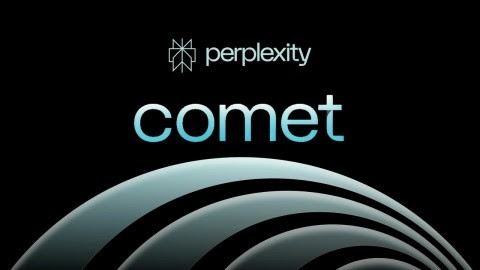Perplexity Comet: AI challengers threaten Google’s search dominance
AI startups like Perplexity challenge Google Chrome with AI-driven browsers, risking industry dominance amid concerns over performance, user adoption, and Google’s antitrust issues, potentially transforming future web search experiences.
ARTIFICIAL INTELLIGENCETECH INFRASTRUCTURETECHNOLOGY
Eric Sanders
7/13/20253 min read


Comet: The AI Browser That Might Actually Dethrone Chrome
I firmly believe we’re staring at a turning point in how we browse the web. I’ve been testing Comet, Perplexity’s new AI-powered browser, and here’s my first impressions: this tool doesn’t feel like Chrome with AI tacked on. It feels like browsing reimagined with a depth I haven't seen before.
Agentic AI by default
Unlike tools that summarize search results, Comet goes all-in with integrated AI. You ask, it acts. It answers, books, compares, and recommends, and it all occurs inline. Comet’s assistant can even send emails and schedule meetings for you.Tab-free productivity
The sidebar assistant negates the need to jump across tabs. Highlight any text or page and ask follow-up questions. No context lost, no workflow broken .Privacy first
All your data stays local so there is no cloud logging, no sneaky model training on your behavior . That’s a comfort I didn’t expect at first, but can really appreciate is this day in age.
Built atop Chromium, it still supports extensions like traditional chrome browsing so you’re not sacrificing familiar functionality. It adds a layer of conversational power and autonomy that just feels... fresh.
My Experience
Over the past week, I moved most of my daily workflow into Comet. Researching reporting tools? I clicked through reviews, then asked the sidebar to compare cost models, integrated platforms, and user ratings all without leaving a page. Planning a meeting? The browser drafted an email invite when I highlighted notes. Booking flights? It pulled date comparisons and optimized schedules in seconds. I felt like it didn’t just answer questions but just executed tasks in a more refined way. A flair turned passive browsing into an active, dynamic experience for me.
What It Means for Others Turning to Perplexity Browsing
Key takeaways with Comet’s arrival to the masses:
Google’s dominance faces real disruption
Chrome holds ~68% of the browser market—but with AI like this baked in, that dominance looks shaky.The AI arms race just moved onto our desktops
OpenAI’s rumored browser and Opera’s “Neon” already point to a new battlefield: browsing itself.Publishers are on notice
Users getting direct answers and AI-completed tasks may skip clicking links altogether, which could cut publishers out of ad revenue unless compensated directly .Privacy becomes a competitive edge
Not selling your clickstream? That may soon matter more than performance tweaks or flashy UIs to discerning users.
Shaping the World for Digital Professionals
If you build products, content, or marketing strategies around web traffic:
Start optimizing for AI interaction, not just clicks. If Comet-style browsers grow, users may prefer summarized, actionable insights over landing on your page.
Explore partnerships. Comet is already rolling out a publisher revenue-sharing program after content licensing pushback.
Invest in structured, machine-readable content. Tags, schemas, metadata, and APIs will help your offerings get surfaced through AI rather than buried in narrative text.
Perplexity as a Future Browser
I’ve seen too many “AI mainstreaming” waves end up as niche curiosities. Comet, though? I feel there focus is different. For Perplexity it's about transforming how we browse, not just what we browse. Google’s launching AI Overviews to hold its crown. Opera and Brave are baking in assistants. OpenAI is rumored to enter the game. Comet acts on your behalf. That’s a fundamental difference and why I believe Comet is the first browser built with tomorrow’s internet habits in mind.
Comet: Worth the Change from Traditional Web Searching?
Here’s what stuck with me: when I asked Comet to summarize and draft an email proposal from a report, it did more than just spit out a script for me. It suggested refining tone, offered subject line variants, and even flagged ambiguous data points and I think it shows proactive design. That’s AI thinking for me.
If AI is going to disrupt browsing and our dependence on clicks then Comet might be the first browser rebuilt around us. Does that sound hyperbolic? Maybe. To those who haven’t used agentic search at scale. But it’s transformation will impact our use and how we interact with the web going forward for everyone.
Are you ready to trust a browser to not just answer your questions, but act on them?
Efficiency
Transform your workflows and reclaim your time.
Contact Us
Need A Custom Solutions? Lets connect!
eric.sanders@thedigiadvantagepro.com
772-228-1085
© 2025. All rights reserved.
